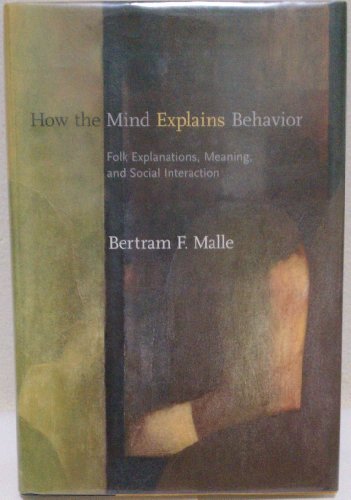Items related to How the Mind Explains Behavior: Folk Explanations,...
How the Mind Explains Behavior: Folk Explanations, Meaning, and Social Interaction (A Bradford Book) - Hardcover

Synopsis
In this provocative monograph, Bertram Malle describes behavior explanations as having a dual nature―as being both cognitive and social acts―and proposes a comprehensive theoretical model that integrates the two aspects. When people try to understand puzzling human behavior, they construct behavior explanations, which are a fundamental tool of social cognition. But, Malle argues, behavior explanations exist not only in the mind; they are also overt verbal actions used for social purposes. When people explain their own behavior or the behavior of others, they are using the explanation to manage a social interaction―by offering clarification, trying to save face, or casting blame. Malle's account makes clear why these two aspects of behavior explanation exist and why they are closely linked; along the way, he illustrates the astonishingly sophisticated and subtle patterns of folk behavior explanations.
Malle begins by reviewing traditional attribution theories and their simplified portrayal of behavior explanation. A more realistic portrayal, he argues, must be grounded in the nature, function, and origins of the folk theory of mind―the conceptual framework underlying people's grasp of human behavior and its connection to the mind. Malle then presents a theory of behavior explanations, focusing first on their conceptual structure and then on their psychological construction. He applies this folk-conceptual theory to a number of questions, including the communicative functions of behavior explanations, and the differences in explanations given for self and others as well as for individuals and groups. Finally, he highlights the strengths of the folk-conceptual theory of explanation over traditional attribution theory and points to future research applications.
"synopsis" may belong to another edition of this title.
From the Inside Flap
From Metapsychology Online Book Review: Malle undertak[es] the challenging task of generating a conceptual framework for explanations of human behavior. Even though he forages through traditional concepts of attribution theory, he ultimately constructs a truly novel conceptual structure for understanding explanations of our behavior and that of others. In the process, he brings forth insights into such explanations that are unlikely to be found anywhere else. The narrative is entertaining, provocative, and, taken as a whole, transparent, making the book an enjoyable read.
From Trends in Cognitive Science: Malle’s mind is a recognizably cognitive one, coming to social interactions already fitted out with a set of variable, nested conceptual constructs. This mind is an intentional system, it has an evolutionary history, and has even had a cultural upbringing that forms and lends ontological status to its social categories. So even though the behavior of the particular people in our lives might continue to puzzle us, Malle gives us hope that the way in which we attempt to answer those eternal questions about it—to explain the ‘whys’ and ‘hows’ of their behavior—is at least tractable.
"This landmark volume simultaneously provides an integrative analysis of past attribution work, bridges it to important developmental research on the theory of mind, and offers a creative new conceptual analysis that promises to lead to fresh insights and discoveries in the all-important study of meaning construction and explanation." --Arie W. Kruglanski, Distinguished University Professor, University of Maryland, College Park
"Malle's impressive scholarly work offers a critical perspective on attribution theory, advancing instead a folk theory of mind and behavior with intentionality at its foundation. This is a significant contribution to psychology, and it will have lasting value." --Bernard Weiner, Professor of Psychology, University of California, Los Angeles
"If you've ever wondered why attribution theory and theory of mind, both concerned with explaining the causes of behavior, have had so little to say to each other, this is the book for you. It develops a broad explanatory framework that gives the covariation model of attribution theory its proper place in the wider context of folk psychological explanations." --Josef Perner, Department of Psychology, University of Salzburg
About the Author
Bertram Malle is Associate Professor in the Department of Psychology and the Institute for Cognitive and Decision Sciences at the University of Oregon. He is the editor of Intentions and Intentionality: Foundations of Social Cognition (MIT Press, 2001).
"About this title" may belong to another edition of this title.
- PublisherBradford Books
- Publication date2004
- ISBN 10 0262134454
- ISBN 13 9780262134453
- BindingHardcover
- LanguageEnglish
- Number of pages328
- Rating
Shipping:
FREE
Within U.S.A.
Search results for How the Mind Explains Behavior: Folk Explanations,...
How the Mind Explains Behavior: Folk Explanations, Meaning, and Social Interaction (MIT Press)
Seller: SecondSale, Montgomery, IL, U.S.A.
Condition: Good. Item in good condition. Textbooks may not include supplemental items i.e. CDs, access codes etc. Seller Inventory # 00084513136
Quantity: 1 available
How the Mind Explains Behavior : Folk Explanations, Meaning, and Social Interaction
Seller: Better World Books, Mishawaka, IN, U.S.A.
Condition: Good. Former library book; may include library markings. Used book that is in clean, average condition without any missing pages. Seller Inventory # 8093313-75
Quantity: 2 available
How the Mind Explains Behavior : Folk Explanations, Meaning, and Social Interaction
Seller: Better World Books, Mishawaka, IN, U.S.A.
Condition: Very Good. Former library book; may include library markings. Used book that is in excellent condition. May show signs of wear or have minor defects. Seller Inventory # 10953036-75
Quantity: 1 available
How the Mind Explains Behavior: Folk Explanations, Meaning, and Social Interaction
Seller: ThriftBooks-Atlanta, AUSTELL, GA, U.S.A.
Hardcover. Condition: Very Good. No Jacket. May have limited writing in cover pages. Pages are unmarked. ~ ThriftBooks: Read More, Spend Less 1.3. Seller Inventory # G0262134454I4N00
Quantity: 1 available
How the Mind Explains Behavior: Folk Explanations, Meaning, and Social Interaction (A Bradford Book)
Seller: HPB Inc., Dallas, TX, U.S.A.
hardcover. Condition: Very Good. Connecting readers with great books since 1972! Used books may not include companion materials, and may have some shelf wear or limited writing. We ship orders daily and Customer Service is our top priority! Seller Inventory # S_426315704
Quantity: 1 available

